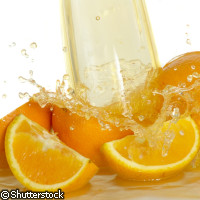Warning: your juice is about to expire
Can biosensors tell juice manufacturers when fruit juice is about to expire? The collective research project QUALIJUICE is working on technology that can. Partly backed by the EU with EUR 1.01 million in funding, the project partners are using the latest in biosensor system technology which enables the manufacturers to detect quality deterioration. Sources say the economic benefits to industry could run into the millions. The benefit for consumers is that they will never buy juice that has expired. Drinking ready made juice straight from a carton rather than squeezing it ourselves is a sign of modern times. But as delicious and quick as it may seem, the question of safety springs to mind. Behind the scenes, scientists are working hard to ensure that the fruit juice consumers relish arrives on their tables as fresh as the day it was made. The QUALI-JUICE project was initiated to develop biosensors to help identify bacteria that could ruin fruit juice. The researchers' efforts substantially minimise the amount of produce lost to quality deterioration, and aim to improve the productivity of the fruit juice industry by around 80%. European small and medium-sized fruit juice producers must contend with the problem of contamination daily. Lactate-fermenting bacteria trigger unwanted fermentation that can cost companies millions in lost revenue. The problem, however, is that their presence may remain unnoticed for days before tests can identify them. The bacteria have the potential to spread and infect countless volumes of fruit juice throughout the production line. When the bacteria are detected, it is too late for pasteurisation due to the organoleptic properties of the juice, thereby rendering it unfit for human consumption. However, if producers are made aware of contamination at an earlier stage, manufacturers can pasteurise the juice and then send it to market. Since this measure consumes energy - thereby raising production costs - it should only be introduced when there is an acute risk of spoilage. In this way, quality assurance which can be offered at a fair price to the customer is guaranteed since efficient production with minimum waste means optimised costs for the manufacturer. The primary objective of QUALI-JUICE is to develop and validate an efficient online early warning system based on biosensor technology, which indicates critical undesired bacterial spoilage during juice production. 'Three efficient offline systems are currently being examined in long-run test series at the facilities of those manufacturers who are participating in the project,' says Dr Hauke Hilz of TTZ Bremerhaven, the organisation coordinating the project. Depending on requirements and investment cost, all three systems offer certain advantages,' he adds. With respect to potential applications, the project predicts that a two-tiered programme will pass on this knowledge to industry: European associations will be trained and then transfer their newly acquired knowledge to their members. Huge interest in the QUALI-JUICE technology has emerged as witnessed by the workshops already held in Spain, Austria, Poland, Romania and Slovenia. Sources say that various systems will be ready for market once the project comes to an end in October 2008.



